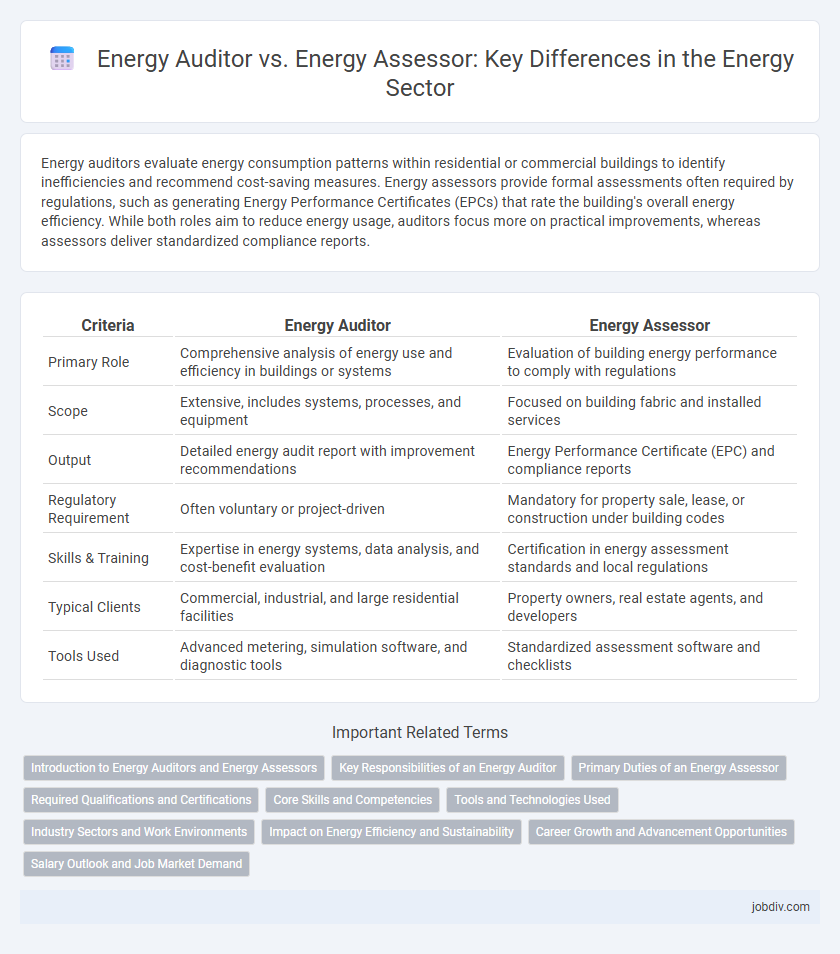Energy auditors evaluate energy consumption patterns within residential or commercial buildings to identify inefficiencies and recommend cost-saving measures. Energy assessors provide formal assessments often required by regulations, such as generating Energy Performance Certificates (EPCs) that rate the building's overall energy efficiency. While both roles aim to reduce energy usage, auditors focus more on practical improvements, whereas assessors deliver standardized compliance reports.
Table of Comparison
| Criteria | Energy Auditor | Energy Assessor |
|---|---|---|
| Primary Role | Comprehensive analysis of energy use and efficiency in buildings or systems | Evaluation of building energy performance to comply with regulations |
| Scope | Extensive, includes systems, processes, and equipment | Focused on building fabric and installed services |
| Output | Detailed energy audit report with improvement recommendations | Energy Performance Certificate (EPC) and compliance reports |
| Regulatory Requirement | Often voluntary or project-driven | Mandatory for property sale, lease, or construction under building codes |
| Skills & Training | Expertise in energy systems, data analysis, and cost-benefit evaluation | Certification in energy assessment standards and local regulations |
| Typical Clients | Commercial, industrial, and large residential facilities | Property owners, real estate agents, and developers |
| Tools Used | Advanced metering, simulation software, and diagnostic tools | Standardized assessment software and checklists |
Introduction to Energy Auditors and Energy Assessors
Energy auditors evaluate energy consumption patterns within buildings and industrial facilities to identify inefficiencies and recommend cost-effective improvements. Energy assessors primarily focus on conducting standardized energy performance assessments, such as Energy Performance Certificates (EPCs), to comply with regulatory requirements. Both roles contribute to energy conservation by analyzing usage data, but energy auditors provide more detailed, customized solutions beyond regulatory assessments.
Key Responsibilities of an Energy Auditor
Energy Auditors conduct comprehensive energy assessments to identify inefficiencies in buildings, systems, or processes by analyzing energy consumption patterns, inspecting equipment, and reviewing utility data. They develop detailed reports with actionable recommendations to reduce energy usage, optimize performance, and lower operating costs. Energy Auditors also ensure compliance with energy codes and standards while facilitating energy-saving measures and sustainability goals for clients.
Primary Duties of an Energy Assessor
Energy Assessors primarily conduct detailed building inspections to evaluate energy performance and identify areas for improvement in insulation, heating, ventilation, and lighting systems. They produce Energy Performance Certificates (EPCs) that rate a property's energy efficiency according to government standards. Unlike Energy Auditors who focus on industrial or commercial energy systems analysis, Energy Assessors specialize in residential and commercial property assessments for regulatory compliance.
Required Qualifications and Certifications
Energy auditors typically require certifications such as Certified Energy Auditor (CEA) issued by the Association of Energy Engineers, emphasizing skills in energy use analysis and cost reduction strategies. Energy assessors often need accreditation under schemes like the Domestic Energy Assessor (DEA) or Non-Domestic Energy Assessor (NDEA), focusing on producing energy performance certificates (EPCs) as mandated by government regulations. Both roles demand strong knowledge of building systems and energy regulations but differ in certification depending on their specific focus within the energy sector.
Core Skills and Competencies
Energy Auditors specialize in identifying energy consumption patterns and recommending efficiency improvements by analyzing data and conducting on-site inspections. Energy Assessors focus on evaluating building compliance with energy regulations and calculating energy performance ratings using standardized assessment methodologies. Both roles require strong analytical skills, knowledge of energy systems, and proficiency in energy modeling software.
Tools and Technologies Used
Energy auditors utilize advanced diagnostic tools such as blower doors, thermal imaging cameras, and data loggers to evaluate building energy performance comprehensively. Energy assessors often rely on software modeling programs and standardized checklists to analyze energy consumption patterns and compliance with regulatory standards. Both professionals integrate smart metering technologies and IoT sensors to enhance accuracy in identifying energy-saving opportunities.
Industry Sectors and Work Environments
Energy auditors primarily operate in commercial and industrial sectors, conducting detailed energy consumption analyses to identify cost-saving opportunities and improve efficiency. Energy assessors focus more on residential and small commercial properties, performing compliance inspections and generating EPCs (Energy Performance Certificates) for building regulations. Both professionals frequently work in diverse environments including manufacturing plants, office buildings, and residential complexes, adapting their methods to sector-specific energy usage patterns.
Impact on Energy Efficiency and Sustainability
Energy auditors evaluate building energy consumption patterns to identify inefficiencies and recommend cost-effective improvements, directly enhancing energy efficiency and reducing environmental impact. Energy assessors provide mandatory compliance evaluations, such as EPC (Energy Performance Certificates), ensuring buildings meet regulatory standards that support sustainability goals. Both roles contribute to energy conservation, but auditors focus on tailored optimization strategies while assessors emphasize standardized certification processes.
Career Growth and Advancement Opportunities
Energy Auditors specialize in evaluating energy consumption patterns to identify cost-saving measures, offering career growth through roles in energy consultancy and sustainability management. Energy Assessors, focused on conducting standardized assessments for compliance and certification, often progress into regulatory advisory or building performance analysis positions. Both careers provide advancement opportunities driven by increasing demand for energy efficiency and regulatory compliance worldwide.
Salary Outlook and Job Market Demand
Energy Auditors typically earn between $50,000 and $70,000 annually, driven by demand in commercial and residential energy efficiency projects. Energy Assessors often command higher salaries, ranging from $60,000 to $85,000, due to specialized skills in compliance and regulatory evaluations. Job market demand for both roles is growing rapidly, with Energy Assessors experiencing a 12% increase driven by stricter energy regulations and incentive programs.
Energy Auditor vs Energy Assessor Infographic

 jobdiv.com
jobdiv.com